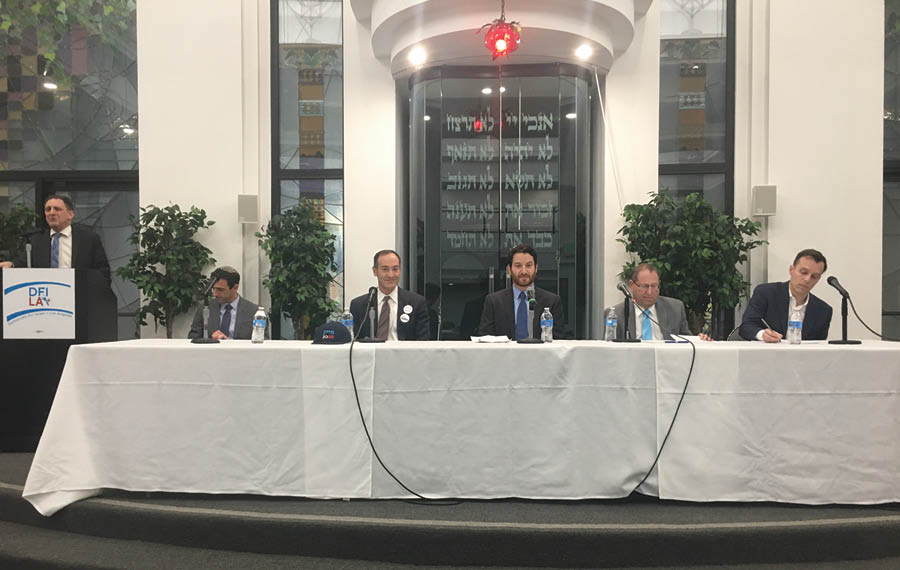 From left: Democrats for Israel Los Angeles Board President Andrew Lachman; Rabbi Joel Simonds, Scott Richman, Joel Rubin, L.A. City Councilmember Paul Koretz, and Rob Meyerhoff. Photo by Ryan Torok
From left: Democrats for Israel Los Angeles Board President Andrew Lachman; Rabbi Joel Simonds, Scott Richman, Joel Rubin, L.A. City Councilmember Paul Koretz, and Rob Meyerhoff. Photo by Ryan Torok
In a forum at Valley Beth Shalom on Feb. 10, Democrats for Israel in Los Angeles (DFILA) hosted surrogates for some of the Democratic presidential candidates, where they outlined their positions on Israel and other Jewish issues.
Former Vice President Joe Biden, Mike Bloomberg, Sen. Bernie Sanders (I-Vt.) and Tom Steyer were represented at the forum. Sen. Amy Klobuchar (D-Minn.), Sen. Elizabeth Warren (D-Mass.) and Pete Buttigieg chose not to participate, DFILA President Andrew Lachman told the Journal.
The debate was largely civil, with speakers agreeing on the need to take back the White House. Lachman said at the start of the event that any of the current Democratic candidates “will be a vast improvement over what we [currently] have.”
Biden was represented by Los Angeles City Councilman Paul Koretz, who said the former vice president was the “one person with enough credibility” to negotiate peace between the Israelis and the Palestinians.
Scott Richman, Bloomberg’s deputy director for Jewish outreach, said the former New York City mayor has always been a strong supporter of Israel. He cited Bloomberg’s flight to Israel in 2014 despite a Federal Aviation Authority ban at the time against the Jewish state.
Joel Rubin, Sanders’ director for Jewish outreach, said Sanders would work hard to ensure Israel’s security and in securing a state for the Palestinians.
Rabbi Joel Simonds, founding executive director of the Jewish Center for
Justice, moderated the two-hour discussion, which drew approximately 100
attendees.
The evening included discussion of the boycott, divestment and sanctions (BDS) movement. Richman said that Bloomberg was opposed to BDS, believing it anti-Semitic and that Bloomberg adhered to the principles set forth by former Jewish Agency Chairman Natan Sharansky that the “three Ds” of anti-Semitism were delegitimization, demonization and double standards.
Rubin said although Sanders is opposed to BDS, the Vermont senator believes that “Americans have a constitutional right to participate in nonviolent protests.”
Rob Meyerhoff, a Steyer staffer, said Steyer, who has made climate change the focal point of his campaign for the Democratic nomination, also saw support for BDS as falling under the banner of free speech.
“I’m not a regular surrogate for Joe Biden,” Koretz said. “I just think he’s the right candidate for the right time.”
As for Bloomberg, Richman said, “He has the experience and the toughness to stand up to Donald Trump.”
While Rubin highlighted the extensive support Sanders has received across the country, Simonds called out some of those supporters. Without mentioning anyone by name, he asked Rubin to explain why Sanders has had political ties with anti-Zionists. In response, Rubin urged people to focus on Sanders’ words about Israel, not those of his supporters who may have made troubling remarks about the Jewish State.
After the event, Lachman told the Journal, “I think it went very well. There was some very good back-and-forth discussion. I think everyone had the chance to make their case.”























 More news and opinions than at a Shabbat dinner, right in your inbox.
More news and opinions than at a Shabbat dinner, right in your inbox.